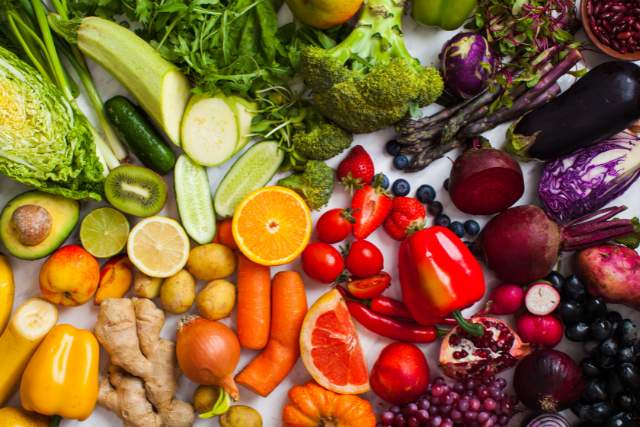Recent Posts
-

- Diabetes-Friendly Nutrition: Smart... 08.12.2024
-

- Nutrition for Chronic... 08.12.2024
-

- Anti-Inflammatory Diet: Food... 08.12.2024
-

- Low-Sodium and Heart-Healthy:... 08.12.2024
-

- Plant-Based Diets for... 08.12.2024
The Health Benefits of Antioxidants Found in Organic Produce

Being unwell today, especially as an adult, maybe an upsetting experience. It hinders you from doing physically demanding tasks and saps your vitality to the point that you just want to lay down and relax (which, by the way, is the best thing for you to do, rest).
This is because our bodies are susceptible to a wide variety of diseases, in particular those brought on as a result of consuming unhealthy and unnecessary meals.
Maintaining a physically clean and internal solid state is vital to prevent and fight illnesses inside your radius. In addition to consuming foods high in antioxidants and taking vitamins and medicines as prescribed, participating in physical activity is another method for maintaining a healthy lifestyle.
Antioxidants are substances that may be found in your body that fight against free radicals. If there are a sufficient number of them, free radicals may cause harm to your body. They've been linked to several ailments, including cancer, diabetes, and heart disease. Your body builds up its antioxidant defenses to combat the effects of free radicals.
Antioxidants, which mainly consist of fruits, vegetables, and many other plant-based, full meals, could also be included in the diet. Numerous vitamins, such as E and C, have powerful antioxidant properties.
As a result of their high levels of antioxidants, organic veggies are excellent news for everyone. This is because the plant, reacting to oxidative stress, creates antioxidant molecules nutritionally advantageous to human beings.
Because they are not sprayed with artificial pesticides or nourished with a significant amount of chemical fertilizer, organic crops are subjected to more stress than conventional crops. Consequently, they produce more substantial quantities of antioxidants to respond to stress.
In high-nutrient environments, such as those shared on farms that use synthetic fertilizer, it is hypothesized that plants would prioritize the formation of new plant tissue above the production of secondary metabolites.
However, growth may be stunted in areas with a lower nutritional density due to the need for more available nutrients. Because of this, there are now more resources accessible for secondary metabolites. Therefore, as the amounts of nutrients go from high to moderate, the levels of antioxidants go up.
Put such theories to rest; here are some of the benefits that antioxidants provide to the body:
These could help ward against cancer if used correctly.
Antioxidants, according to specific research findings, may help prevent some of the damage produced by free radicals, which are known to contribute to cancer development. However, further research is necessary to determine whether or not consuming foods containing antioxidants may help reduce the risk of cancer in individuals.
These might be good for your eyes.
AMD, also known as age-related macular degeneration, is the most common reason for ongoing vision loss in those over 60. The macula, located deep in the retina of your eye, begins to degrade, leading to this condition. Over time you may lose some of the center parts of your visual field.
There is evidence that antioxidants may reduce the chance of developing AMD by as much as 25 percent. If you already have AMD, using these will help you keep more of your vision for longer. Taking antioxidant vitamins C and E may reduce the risk of developing cataracts. Vision is diminished due to these protein deposits clouding the lens towards the front of the eye. Antioxidants help slow the progression of cataracts, which enables patients to maintain their sharp vision for a longer length of time.
Your heart might benefit from them.
There is a great deal of debate over whether or not antioxidants may help lower the chance of developing cardiovascular disease. On the one hand, research has shown that those who consume a greater quantity of fruits and vegetables have a lower risk of getting cardiovascular disease and stroke. The results of some preliminary research point to the possibility that antioxidants are to fault for this benefit.
On the other hand, follow-up clinical tests using antioxidant supplements were unable to prove the same benefits. One possible explanation for this finding is that dietary supplements often include higher antioxidants. It's possible that consuming foods rich in antioxidants is the answer, but further research is needed to determine whether or not there is a real connection.
Although antioxidants may have several positive effects on one's health, it is essential to remember the following information, mainly if you acquire antioxidants via dietary supplements. The antioxidant supplements you take may cause an interaction with another drug that you are taking to treat another condition.
Your risk of getting lung cancer is increased by smoking and consuming excessive amounts of beta-carotene. When you drink a lot of vitamin E, your chance of developing prostate cancer and stroke increases.
Disclaimer: The information provided in this article is for general information purposes only. All information in this article is sourced from other websites, and we do not represent any rights regarding the contents and information on the site. All rights belong to their original owner.





